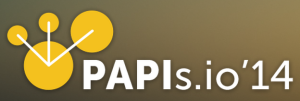We are on the brink of entering the Second Machine Age. Erik Brynjolfsson and Andrew McAfee, the authors of the book with the same title, assert that today’s modern, digital machines very soon will do “for our mental power […] what the steam engine and its descendants did for muscle power” as a consequence of the Industrial Revolution (i.e., the First Machine Age).

Self-driving cars doing 700,000 miles accident-free are a great example. Vinod Khosla – top investor, technology fan, founder of Khosla Ventures and founding CEO of Sun Microsystems – is passionate about Machine Learning, too, and claims that “in the next 20 years, machine learning will have more impact than mobile has” (source: TechCrunch).
Up until recently, Machine Learning technology and algorithms were mostly for domain experts, scientists, or geeks. Now, however, we see more and more organisations using Web APIs to open up these technologies and make them accessible for the masses. In an article on ProgrammableWeb, Louis Dorard – the author of the book Bootstrapping Machine Learning – gives some great examples of such API products existing already. The term used to summarize APIs that give access to Machine Learning is Predictive APIs.
To help make Predictive APIs more mainstream and accessible, Louis Dorard is organizing the 1st International Conference on Predictive APIs and Apps (PAPIs) as general chair. PAPIs will be held on November 17th – 18th, 2014 in Barcelona, Spain.
Attending PAPIs is the best way to learn how to give predictive capabilities to businesses or apps, to discover what others are doing and how, and to find out about the latest tools and developments. Day 1 of PAPIs will be full of practical tutorials and case studies showing how to use Predictive APIs to leverage Machine Learning in apps or services. The evening of Day 1 will feature a Hack Night to put the learnings into practice.
Day 2 of PAPIs will bring some high-caliber keynotes and foster discussion about innovative use cases for Predictive APIs as well as the challenges ahead. The detailed PAPIs schedule can be found online. PAPIs is also perfectly timed as it is held just before the O’Reilly Strata+Hadoop World conference in Barcelona.
Tools for Predictive PAPIs
During Day 1 at PAPIs and as part of the Hack Night, we will show how APItools can be used to integrate with Predictive APIs.

Tracking and managing traffic flows to APIs, reacting if they slow down or fail, dealing with version changes and the like can add massive overhead to development and operations. Designed by 3scale, the makers of the leading API management platform for providers, APItools aims to solve this pain point for developers — making APIs easier to use and more reliable for apps or services. APItools is free and a lot of middleware addons are available as open-source.
At PAPIs we will demonstrate how APItools can be used specifically to integrate, harmonize and customize Predictive APIs. The demo includes quick and easy integration with various API providers (all in one place), monitoring of performance of various APIs (eg, increasing latency), data conversion and customization on server-side, and easy mash-up of various APIs to provide new functionality via new APIs.
We will discuss two use cases:
- Prediction of available bicycles in Barcelona, integrating data coming from Bicing (Barcelona bicycle renting service) and BigML API
- Sentiment analysis of blog posts, integrating with the WordPress API and Alchemy API
Find more about this talk and demo on the Lanyrd page for PAPIs.
The benefits of Machine Learning are clear and will be influential. Making such technologies accessible for masses via Web APIs is a logical next step. Hence, we are happy to support initiatives like the PAPIs conference and present tools and best-practices there to foster communication and support the progress of the community.
We’ll be happy to have a conversation at PAPIs.io. Go ahead and register here to attend the conference.




Pingback: Predictive APIs: Bringing Machine Learning to t...